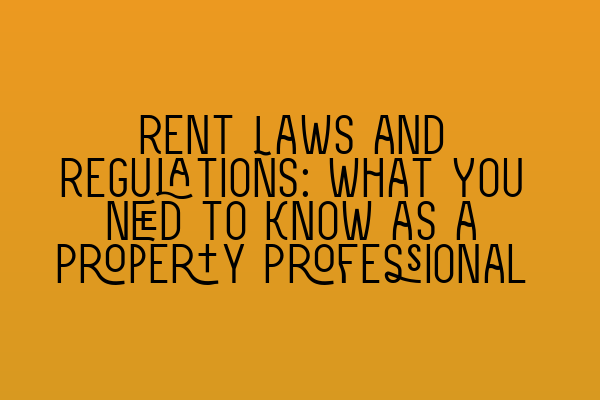Rent Laws and Regulations: What You Need to Know as a Property Professional
As a property professional, it is essential to have a comprehensive understanding of rent laws and regulations. These laws and regulations govern the rights and responsibilities of both landlords and tenants, ensuring a fair and equitable rental market. In this blog post, we will explore the key aspects of rent laws and regulations that you need to know to navigate the intricacies of the property market successfully.
1. Tenancy Agreements and Contracts
One of the fundamental aspects of rent laws and regulations is the creation of a tenancy agreement or contract. This legally binding document outlines the terms and conditions of the rental arrangement, including rent amount, payment terms, duration of the tenancy, and other important details. It is crucial for property professionals to ensure that these agreements comply with the relevant laws to protect the rights of all parties involved.
2. Rent Control and Rent Increase Restrictions
Rent control measures are implemented to prevent landlords from excessively increasing rents, protecting tenants from exorbitant rental costs. These laws vary from jurisdiction to jurisdiction, and property professionals must stay updated on the specific regulations in their area. Additionally, there may be restrictions on the frequency and magnitude of rent increases, ensuring that tenants are not burdened with sudden and unreasonable financial demands.
3. Security Deposits and Tenant Protection
Security deposits are a common practice in rental agreements, serving as a form of insurance for landlords against potential damages or unpaid rent. However, there are regulations governing the collection, use, and return of these deposits that property professionals must abide by. Understanding the rules regarding security deposits is critical to avoid legal disputes and protect the rights of both landlords and tenants.
4. Eviction Procedures
While every landlord hopes for a smooth and hassle-free tenancy, there may be occasions where eviction becomes necessary. Property professionals should be well versed in the legal procedures and grounds for eviction to ensure compliance with the law and protect the rights of tenants. It is essential to follow the proper process and provide tenants with fair notice and an opportunity to address any issues before resorting to eviction.
5. Discrimination and Fair Housing Laws
Discrimination in the rental market is strictly prohibited under fair housing laws. Property professionals must ensure that they adhere to these laws and treat all potential tenants and renters equally, regardless of race, gender, religion, or other protected characteristics. Implementing fair housing practices strengthens the integrity of the rental market and fosters diversity and inclusivity.
6. Maintenance and Repairs
Property professionals have a responsibility to ensure that rental properties are habitable and in good condition. This includes addressing maintenance and repair issues promptly, such as plumbing problems, electrical faults, or structural concerns. Understanding the applicable regulations regarding maintenance and repairs is crucial to fulfill this duty and avoid potential legal liabilities.
Conclusion
Rent laws and regulations form the foundation of a fair and equitable rental market. As a property professional, it is essential to stay informed about these laws and ensure compliance to protect the rights of both landlords and tenants. By understanding the intricacies of tenancy agreements, rent control, security deposits, eviction procedures, fair housing laws, and maintenance requirements, you can navigate the property market successfully and provide a professional and reliable service to your clients.
To learn more about the legal aspects of property law and land law, check out these related articles:
– 41. Test Centers for SQE: Convenient Locations for the Exam
– 39. Skills Assessed in SQE: Understanding the Exam Content
– 40. Interviewing in SQE: Mastering the Assessment Process
– 22. Balancing Work and SQE Prep: Strategies for Success
– 24. Unlocking the Secrets to Passing the SQE Exam
These articles will provide you with valuable insights and knowledge to excel in the field of property law.
At SQE Property Law & Land Law, we are here to support you in your professional journey. Contact us today to learn more about our services and how we can assist you.
